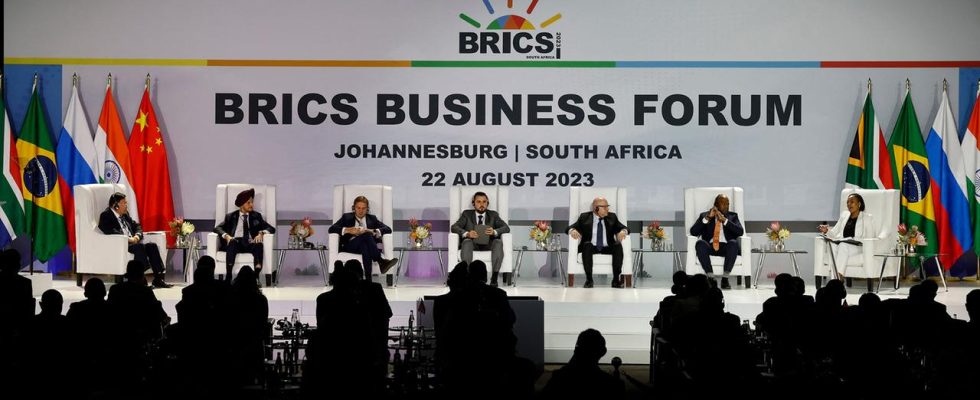faq
The BRICS countries trade in dollars on a large scale – but they want to become more independent. A separate currency is under discussion. Could this happen?
How realistic is a separate BRICS currency?
The road to a separate currency is long. Economists emphasize that even if the BRICS countries (Brazil, Russia, India, China, South Africa) actually agree on it, it will take a very long time to introduce this currency.
The implementation of the euro has shown how complex it is to combine different currency areas. All countries bring their own individual expectations and problems with them.
Not only the distances, but also the differences between the BRICS countries appear to be even greater than in the euro zone. The idea of a separate currency is still vague. For example, it is unclear what will happen to the existing national currencies.
Observers do not expect concrete plans to be presented at the current summit in Johannesburg. However, the BRICS association already has at least one development bank of its own – the New Development Bank. It could theoretically take care of the development and introduction of its own currency.
Would a BRICS currency weaken the dollar?
The introduction alone would probably not be enough to permanently weaken the dollar. According to analysts, the decisive factor would be whether the new currency is actually used on a large scale and whether it proves to be stable.
The BRICS countries bring a great deal of economic power with them: the five countries currently account for around a quarter of global economic output. The expansion of the alliance, for example in the “BRICS plus” format, is also being discussed.
If the alliance grows, the economic power can also increase again – but it may then become even more complex to actually implement the plans for a new currency.
However, US Treasury Secretary Janet Yellen currently sees no threat to the dollar as the world’s leading currency. According to Yellen, there is no alternative to the US currency in the foreseeable future.
What would be the consequences for the price of gold?
A major gold-backed currency could actually increase demand for gold, after all, central banks would need to stock up on gold. This could also push the price of gold higher.
As a first step, the precious metal should come back into focus as a hedge. This is reminiscent of the times of the gold standard, when there were stable exchange rates from national currencies to gold. This system was phased out many decades ago.
Since then, the gold price has fluctuated depending on the currency and is dependent on many different factors – a principle that would probably not change even with a gold-backed BRICS currency.
What role does Russia play in the considerations?
Russia’s affiliation is a thorny issue for the other members of the BRICS alliance. A common currency would be a signal to the West that it should close ranks with the country that started a war in Ukraine. This step would be a success for Russia: Moscow in particular has an interest in reducing dependence on the dollar.
On the other hand, the BRICS countries are still interested in trade with Western countries – a trade that has so far been largely settled in dollars. If the BRICS alliance grows, this could help to reduce this economic dependency in the long term and actually emancipate itself more and more from the dollar.

